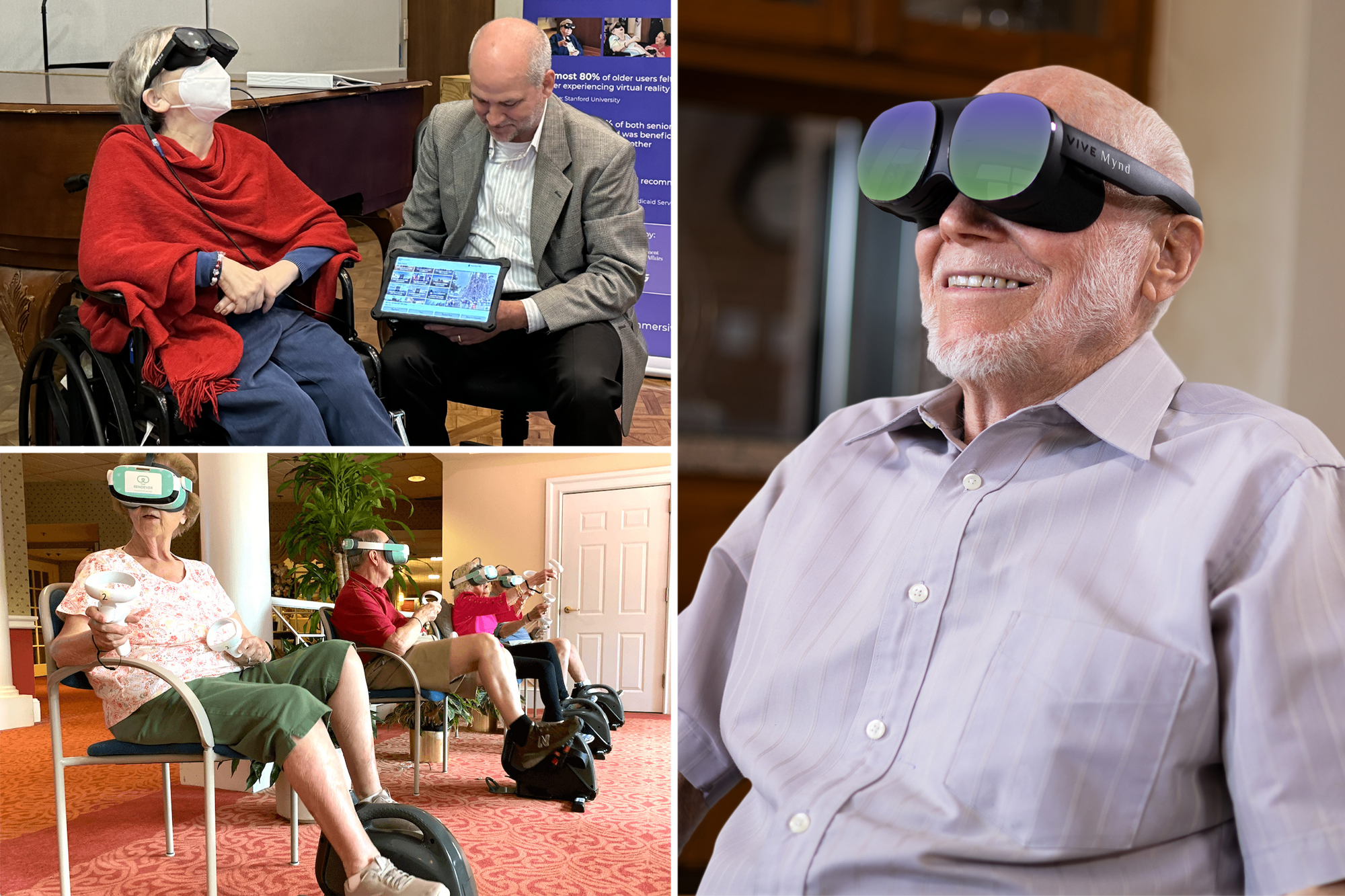
On a summer afternoon when most New Yorkers are chained to the nearest air conditioner, the residents of the New Jewish Home on West 106th Street were enjoying a very active day.
There was the trip to Broadway, a cuddle with puppies, a scuba diving adventure and skydiving over the Swiss Alps—and all without breaking a sweat.
For Walter Delascasas, 77, the highlight of the day’s adventures was a nostalgic visit to the street in Havana where he grew up.
Everything was still there – he was even able to “know the trees” since he was a child.
Delascasas and his neighbors were able to effortlessly travel the world — and still be home in time for dinner — with a little help from virtual reality company Mynd Immersive, which believes the technology that’s supposed to rot the minds of generations of the young can stimulate the brain of the elderly.
And the pixels aren’t just for kids: New Jewish is one of 60 nursing facilities in New York and New Jersey where “The Great American Elder,” as Mynd bills it, will go on full display in the coming months as part of an initiative to improve the cognition and quality of life of the elderly.
Elderly people, with the help of caregivers, can slip on one of Mynd’s futuristic headsets and they enter a real panoramic environment – even personal or nostalgic places for the wearer – that can benefit mental health.
Through Google Earth and other technologies, Mynd has created more than 200 “senior-friendly” games, immersive videos and virtual vacations that allow residents to “travel the world” without leaving the nursing home.
For most at this age, it offers them an experience they would never dream of in real life.
Brooklynite Elizabeth Albedia, 60, who engaged in a “Planet Earth”-style underwater diving simulation, said she felt she was “right there with the sharks” — but without the risk of being mauled by the deep-sea predators.
“I’ve never experienced this before,” Albedia told The Post.
Lorrie James eschewed a Jaws ride and instead opted for a virtual tour of the Great White Way to take in a performance of — and a behind-the-scenes look at — the long-running Broadway hit “The Lion King.”
“The lion actually went on stage with the performers and we were able to see what was going on behind the scenes,” the 53-year-old told The Post. “You forget where you are in the moment; [it’s] a thousand times better than using your imagination.”
And widow Cecilia Ferreiro, 65, from Ecuador, choked up as she recounted how she digitally revisited a holiday to Spain she took with her husband 30 years ago.
“It looked a little different, but the same atmosphere,” Ferreiro said. “I liked it.” In the future, she hopes to travel to virtual versions of Africa and Asia.
“The four walls [of nursing home rooms] sometimes be gentle, sometimes be sad,” Chris Brickler, CEO and co-founder of Mynd Immersive, told The Post, explaining that the company is “taking someone who might be worried about the state they’re in, letting them go to a beach or a mountain or a lake.”
Along with reducing feelings of loneliness, virtual reality games have been shown to improve memory by improving players’ ability to distinguish between old and new environments, according to research.
These VR adventures are part of a treatment known as reminiscence therapy, which typically involves showing seniors photos and other memories of their youth to cultivate joy. A 2022 study found that VR reminiscence improved “anxiety, apathy, and cognitive function immediately following the intervention in individuals in aged care facilities.”
According to a recent Stanford University study conducted in collaboration with Mynd, 79% of seniors said they felt more positive after using technology, and more than half felt less isolated.
Plus, these Avatar-type adventures, Brickler said, “allow people who are less mobile and sometimes cognitively declining to feel like they have some opportunity.”
And it’s working on the Hebrew Home in Riverdale by RiverSpring Living, which started with some headphones from Renever in 2021.
The residential care home now has about 50 headsets for daily group immersion sessions, ranging from virtual vacations to spin classes.
David Siegelman, Hebrew Home’s senior vice president of quality and corporate compliance, said he has noticed a positive effect on residents.
The shared setup of Renever VR sessions helps seniors connect, explaining how he’s seen users “increase the size of their social networks” and even participate in more community events outside of the virtual world.
While Siegelman said it’s “just one tool in our arsenal of tools for dementia,” a person with advanced dementia was able to reconnect with his musical background as an opera singer thanks to VR.
“[The staff] would bring an iPad or an iPod with opera. He would smile and love it,” he said. “We couldn’t find opera in VR, but we found a whole philharmonic show.”
“We put the headphones on and played it, and we just sat back and let him watch it,” Siegelman recalled. “It came to an end and as we are taking off the headphones, he starts belting out an operatic song.
“You could see how comforting it was for him.”
#NYC #seniors #embracing #fight #loneliness #dementia
Image Source : nypost.com